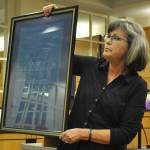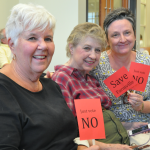Rezoning requests tabled
Published 2:16 pm Thursday, September 28, 2017


Planners in Farmville unanimously voted Wednesday to table two controversial rezoning requests from Robert and Sherry Martin and Walk2Campus Holdings LLC while asking the town council to authorize the town manager to prepare a request for proposals for outside consultants to assist the town in updating its comprehensive plan and reviewing and proposing amendments to the town’s zoning ordinance.
The action followed 27 people who spoke against the projects — citing quality-of-life issues, noise, the historic nature of the area, parking, trash, traffic, the precedent the rezoning could set and density levels.
The recommendation to table the requests — which have drawn feverish opposition — came from Town Manager Gerald Spates following the public comment portion of the meeting, where planners were poised to vote to hold public hearings on the requests.
Trending
The Martins are requesting to rezone their just more than an acre of property they own at the intersection of High, Oak and Appomattox streets for a proposed five-story, 95,000-square-foot student apartment complex from R-3 Residential to R-3A Residential, while Walk2Campus Holdings LLC President and CEO Matthew King is seeking to rezone 37 of his firm’s student housing properties to R-3A Residential.
The Martins’ request includes repealing the density level maximum of 10 units per acre for the R-3A Zone to allow for the proposed 195-bed apartment complex. The R-3A Zone is the same that Longwood University’s main campus is classified as.
“Scott (Davis) has experience in economic development and zoning, and will be starting in his position of assistant town manager on Monday,” Spates said, asking the commission “to get Mr. Davis involved to help guide and direct the process ahead of us.”
Spates said not only did the comprehensive plan need revamped, but also taking “a look at improvements to our zoning ordinance to bring them up to date with current standards.”
Spates noted that outside consultants would help with the process of amending the documents. “I think by going through this process and the public hearings, it would give the citizens an opportunity to weigh in on any of these changes that would be made.”
“I think we need to get the public involved in the comprehensive plan and in the zoning (ordinance),” Commission Chairman Sherry Honeycutt said.
Trending
“We’re at a point where the town really needs to think about where we’re headed. …,” Ward E Commissioner Jerry Davenport said. “It’s a serious breaking point where we’re coming to.”
“You’ve got time to act on (the requests) … I don’t think this group or any group is ready to act right now,” Spates said.
The meeting — which served as the introduction of the rezoning requests to the commission — saw standing room only as speakers lambasted the proposals.
“It is not time to start tearing down homes that have been a part of this community for over 100 years,” said Kim Boswell, who lives on High Street, with his wife, Hannah, who asked planners to “please keep the zoning the same in these locations.”
Charles Green, who lives on First Avenue, said if the requests were approved, historic Farmville and other areas could be “profoundly affected.”
“The feel of the old neighborhoods could be destroyed,” he said, later noting such development could “obliterate” neighborhoods.
“This has really gotten to me bad,” said Grove Street resident Kathy Thompson, who noted she’s lived in Farmville her entire life. She noted when she wanted to build on a lot facing Oak Street, the town told her that a new driveway from Oak “was not a good idea because of lots of traffic already on Oak … I respected the town’s advice … If one person turning off Oak Street was not safe, how could the town possibly think 195 more people would be safer?”
Faye Green, who lives in the “still historic Avenues,” said she was “horrified, to put it mildly,” when she learned of the proposals.
“That Martins’ can still do something nice for the town of Farmville — withdraw their request,” she said.
Harlan Horton said that Sherry Martin’s assertion that the area was no longer historic “could not be further from the truth.”
After citing that Longwood University had nothing to do with the Martins’ proposal and noting the areas Longwood concentrated students off campus in neighborhoods away from historic neighborhoods, “it certainly seems the developer would like us to think that it does. Mr. (Mike) Kelley (the developer who’s working with the Martins) loves to talk about ‘Taylor,’” Webber said, referring to W. Taylor Reveley IV, Longwood’s president, which drew a loud applause from the audience.
“Well, Mr. Kelley, being on a first-name basis with somebody doesn’t mean that person necessarily approves or supports of what you want to do.”
Michele Varga said the proposed rezoning requests were in “total disregard for other homeowners in the historic district,” calling on the Farmville-Prince Edward Historical Society to weigh in on the proposals.
“My concern is about the density of students and their monitoring … How will 195 students be overseen in the proposed building?” said Marianne Dennison, who lives on Grove Street.
Julie Ross called the matter “a quality of life issue,” noting that “when laws are removed, anything is possible.”
She said what Walk2Campus was planning should the rezoning requests be approved would be “utter devastation,” citing a statement by the firm in its rezoning request that reads, “intent is to seek future projects on the same scale (60 units per acre), which would include the demolition of current buildings with the intent of building higher-density, multi-story apartment buildings with accompanying parking facilities.”
Dan Mossler called comments from Sherry Martin regarding the area no longer being historic “cynical, self-serving and just plain wrong.”
“This request is the exact opposite of the town’s comprehensive plan,” said Naomi Tsigaridas.
Mary Stinson, who noted she’s traveled all over Virginia, visiting many small towns, said, “When you rezone one part of Farmville, it opens up a big can of worms.”
The properties Walk2Campus is seeking to have rezoned are on Grove, High, Appomattox, Garden, St. George, High, Beech, Buffalo and Randolph streets in town. Most are in proximity to Longwood University.
Uses in the R-3A Zone include rooming and boarding houses, single-family dwellings and university-related facilities with a conditional use permit.
Though the plans for the proposed student apartment complex are termed conceptual, the project developer says the number of floors — rather than a shorter building — and having one building at the intersection — rather than having two smaller ones — is cost effective.
“The economy (and) from a construction standpoint … you almost have to make it one (building) because … for example, a building like this you’d have to put elevators in, you’d have to put stairwells in, you know, it becomes an economy of scale and you’ve got to remember you’ve got to be very respectful of the students of what the rent factor is,” said Kelley.







